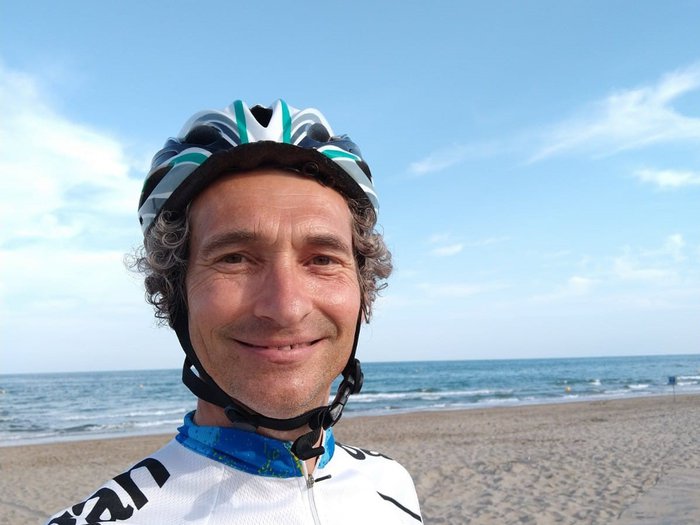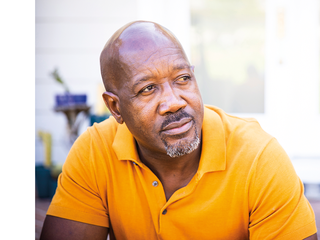How to talk to your medical team
Quentin reflects on the importance of good communication with your medical team when you’re diagnosed with blood cancer.

Quentin, diagnosed with acute myeloid leukaemia (AML)
Quentin and others worked with us to create a booklet of key information for anyone who's just been diagnosed with blood cancer, Your blood cancer diagnosis: What happens now? Order free copies for yourself, your family and friends.
I was diagnosed with acute myeloid leukaemia (AML) in March 2018. It’s a fast-growing type of blood cancer and it was a massive shock when I was told. I found it very difficult to take it all in.
I hadn’t had any health issues previously, so I had little experience of talking to healthcare professionals. But I soon discovered that as well as treatment, I needed a proper understanding of what was happening to me. In fact I’d say it was essential for my recovery.
I started my treatment in France but came back to the UK for a stem cell transplant. This involved five weeks in hospital, mostly in isolation, with various staff bustling in and out of my room.
I could see how busy the staff were, but I had lots of questions. How am I doing? Should I be feeling this? What happens next?
I’m the kind of person who can only process things if I understand them. I wanted to know not just what, but why? At times I found it difficult to get answers, sometimes because the staff were pressed for time, and sometimes because they weren’t the right person to ask. But visits with my consultants more than made up for this. That’s because they would take the time, in spite of being mind-bogglingly busy, to explain things. And explain again if I didn’t understand.
One thing I wasn’t aware of at the time is that everyone with cancer should have a keyworker, usually a Clinical Nurse Specialist (CNS). The idea is they’re your main point of contact in the team, whether you’re in hospital or at home. So if you don’t have a CNS, ask for one.
Make sure you understand
Blood cancer is such a complex subject, and it’s even harder to get your head around it if you’re feeling ill or tired or your brain’s foggy or your emotions are going bananas.
Here’s my advice on making sure you understand what’s happening:
- Don’t be afraid to ask questions. I believe your treatment goes better if you completely trust your medical team. Questions are a good way to start a conversation and to build trust.
- Don’t be afraid to challenge what you’re told. It’s OK to ask: “Why am I being given this treatment? What are the side effects? Are there any alternatives?”
- Don’t be tempted to say you understand if you don’t. Just take a breath and say, "I'm sorry, I don't understand, could you please explain that to me again." Sometimes we need to remind medical staff we haven’t all been to medical school!
- Keep yourself informed. I used the Blood Cancer UK booklets and website because they gave me information I could trust. They can’t give you advice about your individual circumstances, but they help you understand your situation better, so you can decide what questions to ask. And be confident that your questions are good ones.
- Think about how medical staff are feeling. I was always aware they might be tired, hungry or stressed. Whenever I could, I’d smile, say thank you and ask how they were doing. It helped me build good relationships.
Be organised
My medical team were extremely busy and I sometimes felt guilty taking up their time. Being organised meant I could take up less time, while still making the most of my appointments.
These are my tips on how to get organised:
- Take notes on how you’re feeling. It helps your team if you keep daily notes on symptoms such as your energy levels, pain or mood. You can prepare for your appointments by reading through your notes and give accurate answers when your medical team ask how you’ve been.
- Record your appointments. Try to write things down during or immediately after each appointment so you remember exactly what you were told.
- Take someone to your appointments. If you have someone who’s willing to go with you, do take advantage of it. I was lucky enough to have my wife with me so I could check everything with her afterwards.
- Make a list of questions. Jot them down as you think of them. Then before your appointment, list them in priority order, in case you get less time than you expect.
- Tell the story so far. It’s often useful to give a quick summary of your symptoms and treatment to date. You might mention something that day’s medical staff aren’t aware of, which could help them decide the best way forward.
It helps to get answers
I might be unusual in the level of detail I needed from my medical team. And I’m aware that other people may not feel the same. But I’m sure everyone who’s diagnosed with blood cancer has questions to ask, and I know from experience that getting clear answers can make all the difference.
If you’re newly diagnosed or you’d like to boost your confidence in talking to your medical team, contact our support service. We help lots of people prepare for their medical appointments, so please do get in touch on 0808 2080 888 or [email protected].
You can also talk to other people who’ve been diagnosed blood cancer, and who can give you the benefit of their experience, on our online community forum.

I've just been told I have blood cancer
For people who've recently been diagnosed with blood cancer, we have information you may find useful and supportive at a difficult time.
